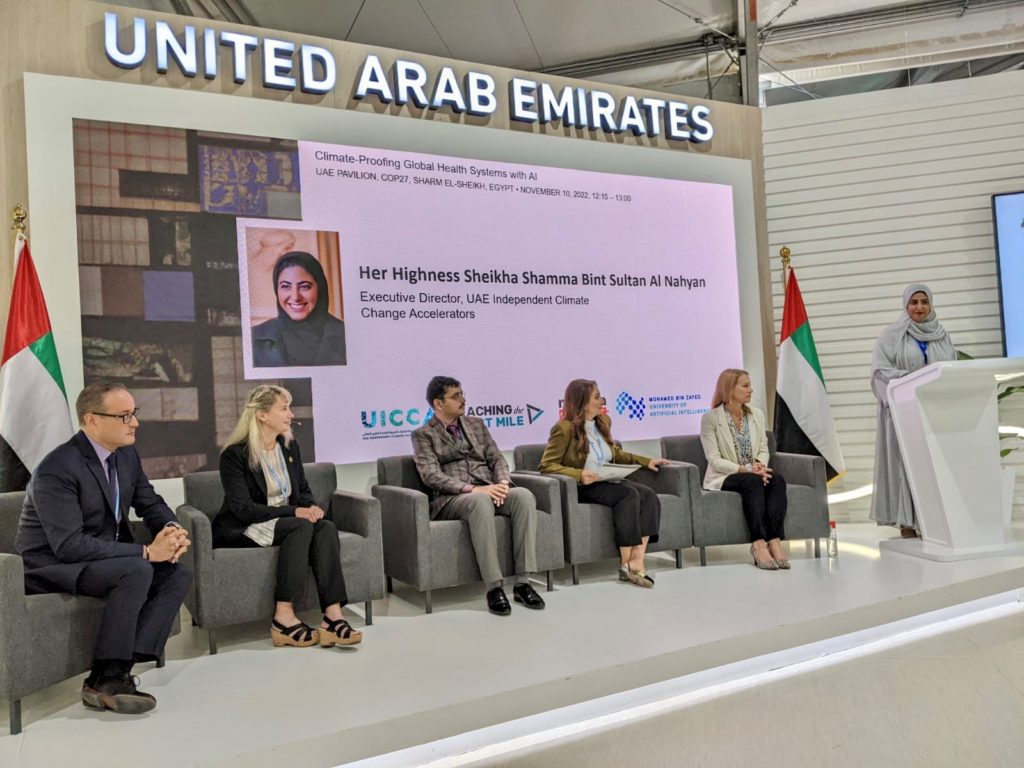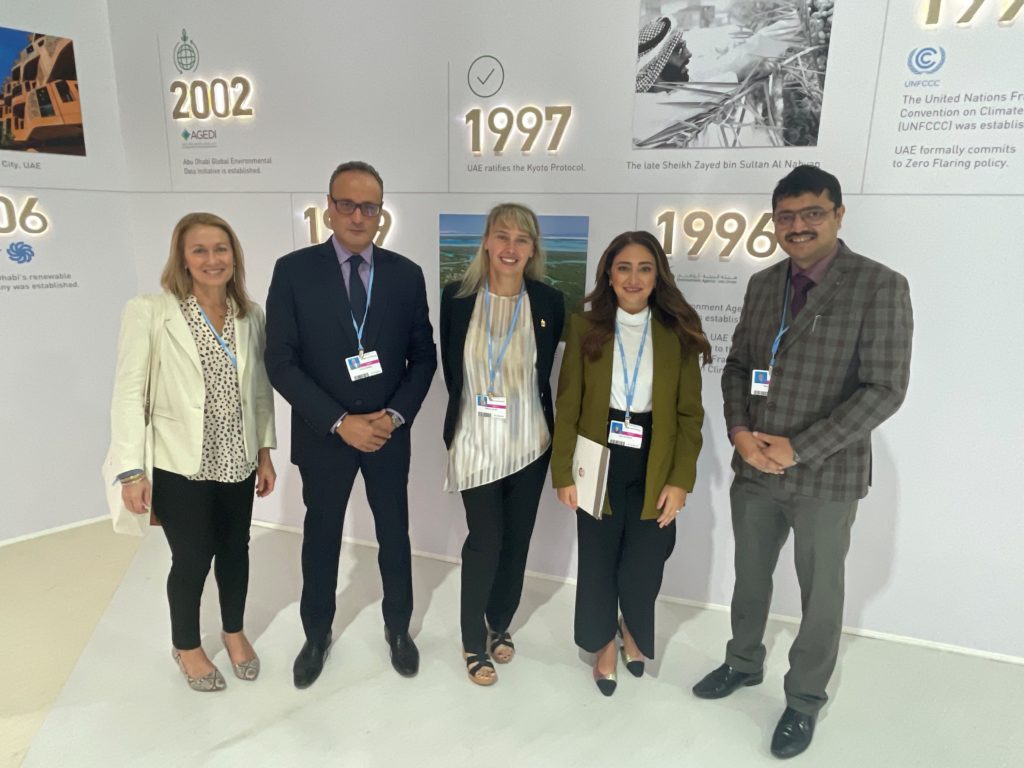
Sharm El-Sheikh, Egypt (November 10, 2022) – Malaria No More, in partnership with the Reaching the Last Mile Initiative, today hosted a panel discussion through its climate and global health initiative, Forecasting Healthy Futures. The session was entitled “Climate-Proofing Global Health Systems with Earth Observation Data, Artificial Intelligence, and other transformative technologies.”
The discussion centered on emerging global health solutions, fueled by catalytic investments by the Reaching the Last Mile initiative. Panelists discussed the challenges climate change poses for disease elimination efforts and presented a selection of highly sophisticated prediction and planning tools using multiple data sources, high-resolution earth observation data, and artificial intelligence to predict and prevent disease outbreaks.
Her Highness Sheikha Shamma bint Sultan bin Khalifa Al Nahyan, the Executive Director of UAE Independent Climate Change Accelerators (UICCA) and renowned philanthropist, delivered the keynote address, which was held at the UAE Pavilion at 2022 United Nations Climate Change Conference (COP27) in Sharm El-Sheikh, Egypt.
This was followed by a panel moderated by Kelly Willis, Managing Director at Malaria No More, with participation from the following speakers:
- Tala Al-Ramahi - Director, Reaching the Last Mile
- Dr. Hosni Ghedira - Director of Engagement Services, Mohamed bin Zayed University of Artificial Intelligence
- Tatiana Loboda - Professor and Chair, Department of Geographical Sciences, University of Maryland
- Dr. Kaushik Sarkar – Director, Institute for Malaria and Climate Solutions, Malaria No More
The panel was held at the 2022 United Nations Climate Change Conference (COP27) during a session on climate change and global health. Malaria, one of the world’s oldest and deadliest diseases, devastates families and perpetuates the cycle of poverty in many communities and countries. Climate change threatens to slow progress toward eliminating malaria and many other climate-sensitive infectious diseases as climate events, such as rising temperatures, changing rainfall patterns and extreme weather, disrupt health systems and impact the range and seasonality of vector borne diseases.
Sheikha Shamma bint Sultan bin Khalifa Al Nahyan, Executive Director of UICCA, commented: "Technology is an invaluable resource which we must optimize in order to identify innovative means to tackle the climate crisis. To achieve this, it is essential that private and public sectors work together to bring forward technological advancements, enabling us to harness the power of innovation to transform global health outcomes and secure the future of our planet and its people."
Sheikha Shamma added: “While here at COP27, the most important climate change action conference in the world, I implore my peers in the sustainability community to encourage international leaders to place global health and climate action at the top of their agendas.”
Tala Al-Ramahi, Director at Reaching the Last Mile, added: “As the world gathers in Egypt to focus on mitigating climate change, it’s more important than ever that we exert maximum efforts to build an understanding of how this change affects some of the world’s most vulnerable populations, and how preventable diseases are continuing to trap families in cycles of poverty. Alongside our valued partners, we are committed to exploring innovative solutions and new technologies to assist us in the fight against such diseases, and help shape our future disease eradication policies, and strategic approach.”
Kelly Willis, Managing Director at Malaria No More, said: “COP27’s emphasis is on the active implementation of climate commitments, and that’s exactly what we’re doing. Forecasting Healthy Futures means engineering smart solutions to the challenges imposed on the world’s most vulnerable, by rising temperatures and changing weather patterns. The United Arab Emirates and Reaching the Last Mile are leading the charge, and all FHF consortium members are determined to end malaria and other global health challenges in the context of climate change.”
Ahead of today’s panel discussion, Forecasting Healthy Futures announced plans to hold its inaugural Summit on February 27-28, 2023, in Abu Dhabi. The Summit will be the first of its kind, bringing together global policymakers alongside technical leaders spearheading emerging solutions for climate-sensitive infectious disease for workshops and a 2-day plenary conference.
Since its launch in 2020, Forecasting Healthy Futures has worked to “climate proof” infectious disease elimination efforts by developing increasingly sophisticated prediction and planning tools and designing supportive policies to help governments implement them, to better time and target effective health interventions amid the many changes brought about by global warming. In January 2022, Forecasting Healthy Futures launched the new Institute for Malaria and Climate Solutions (IMACS), a global institute with the mission to combat malaria in the face of climate change and weather volatility.
###

###
About Malaria No More
Malaria No More envisions a world where no one dies from a mosquito bite. More than a decade into our mission, our work has contributed to historic progress toward this goal. Now, we’re mobilizing the political commitment, funding, and innovation required to achieve what would be one of the greatest humanitarian accomplishments – ending malaria within our generation. For more information, visit www.MalariaNoMore.org.
About Forecasting Health Futures
Forecasting Healthy Futures is a growing coalition of global health, technology, and public sector partners coming together to bring greater attention to the inequities at the intersection of global health and climate change, and to promote proactive solutions that use integrated data and artificial intelligence to anticipate and mitigate the worst health effects of a warming planet. Forecasting Health Futures’ partners include Reaching the Last Mile, Mohamed Bin Zayed University of Artificial Intelligence, the Global Institute for Disease Elimination (GLIDE), PATH, the Tableau Foundation, IBM’s Weather Company, and the Institute for Health Metrics and Evaluation (IHME). For more information, visit: www.ForecastingHealthyFutures.org
About Reaching the Last Mile
Reaching the Last Mile (RLM) is a portfolio of global health programs working towards disease elimination that is driven by the personal commitment of His Highness Sheikh Mohamed bin Zayed, President of the United Arab Emirates. The Initiative provides treatment and preventative care in communities that lack access to quality health services, with a specific focus on reaching the last mile of disease elimination. RLM’s mission represents His Highness’s dedication to ending preventable diseases that affect the world’s poorest and most vulnerable communities and helping millions of children and adults live healthy, dignified lives. For more information, visit: https://www.ReachingTheLastMile.com
About Mohamed bin Zayed University of Artificial Intelligence (MBZUAI)
MBZUAI is a graduate, research university focused on artificial intelligence, computer science, and digital technologies across industrial sectors. MBZUAI aims to empower students, businesses, and governments to advance artificial intelligence as a global force for positive progress. The university offers an array of graduate programs designed for the pursuit of advanced, specialized knowledge and skills in artificial intelligence including computer vision, machine learning, and natural language processing. For more information, please visit www.mbzuai.ac.ae



